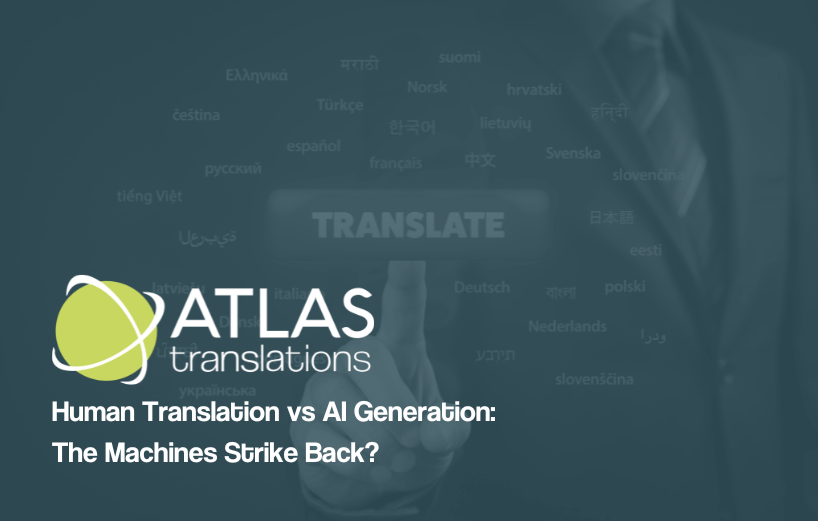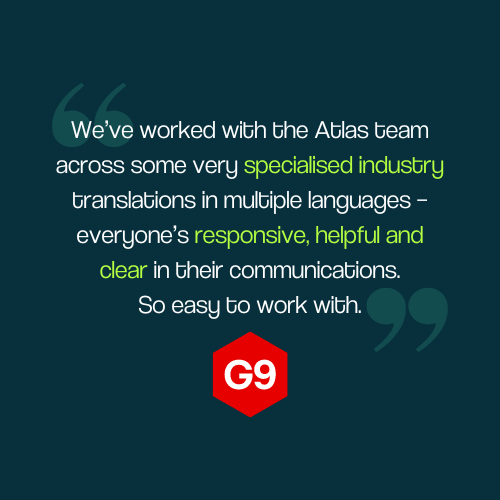Human Translation vs AI Generation: The Machines Strike Back?

Thinly veiled Star Wars™ references aside, artificial intelligence (AI) is taking over everything, from semiconductors to soap and, yes, even artwork. Remember when Microsoft gave the Mona Lisa an AI makeover? Awkward. It also extends to the ongoing human translation vs AI generation battle of the millennium. We mere mortals sometimes struggle as we see the machines strike back. As predictions abound that AI will make most jobs redundant, we sincerely hope that includes dishes and laundry.
Should we place the translation industry in that soon-to-be-redundant group? Is a purely AI-driven translation service really the future? Honestly, it just doesn’t sound like it. Why? Because good, true, and accurate translation is so much more than just putting words on a page. Let’s take a one-and-a-half pike into why human translators still reign supreme.
AI Pros vs. Cons
AI translation can be impressive. Apps like ChatGPT, Gemini and CoPilot have taken it from basic word-for-word translations to predicting context and recognizing patterns. But it’s not all smooth boot-ups and seamless updates. Here’s a quick look at some of the pros and cons:
Pros
Speed and Efficiency:
AI translation tools can process and translate documents in a matter of seconds, which is incredibly beneficial for sectors where time is of the essence. For example, in the news industry, having the ability to quickly translate breaking news stories allows for rapid dissemination of information across the globe.
Cost-Effective:
Once an AI translation tool is developed or purchased, it can translate documents without ongoing labour costs. This makes it a cost-effective solution for businesses that need to translate large volumes of text regularly. For example, e-commerce companies can use AI to quickly translate product descriptions into multiple languages without incurring the high costs associated with human translators.
Scalability:
AI can handle large-scale translation projects with ease, whether it’s a few sentences or entire books. This scalability is advantageous for businesses looking to expand into new markets quickly. For instance, tech companies can use AI to translate software interfaces and user manuals into multiple languages simultaneously, ensuring a consistent user experience worldwide.
Cons
Quality Depends on Input:
The accuracy of AI translations heavily relies on the quality of the input text. If the source material is poorly written or contains errors, the AI will likely produce a flawed translation. This can lead to misunderstandings and requires additional time and effort to correct these mistakes, potentially negating the initial time-saving benefits.
Sacrificing Accuracy for Speed:
While AI can provide fast translations, it often sacrifices accuracy. This is particularly problematic in situations where precision is critical, such as in legal or medical translations. A minor error in these fields can lead to significant consequences, such as legal disputes or health risks.
Context and Cultural Nuances:
AI struggles with understanding and translating context, tone, and cultural nuances. Human language is rich with idioms, humour, and cultural references that AI often misinterprets. For example, marketing slogans or advertising campaigns that rely on cultural humour or puns can be completely lost in translation, potentially offending or alienating the target audience.

Taking the Human Approach
For creative content, localized marketing materials, or official documents, human translation is a must. Professional translators provide the insight and understanding that AI lacks, ensuring your message always hits the mark.
Localisation adapts products or content to specific markets, covering not just language but also cultural, societal, legal, and visual elements. Translations are a creative process that requires a deep understanding of linguistic nuances and cultural customs.
Remember the Coca-Cola “Share a Coke” campaign? It worked wonders in the UK but flopped in China due to different cultural values. In China, the campaign was seen as promoting individualism over family, which brutally clashed with traditional family values.
And, let’s not forget when Coca-Cola went with “Ke-kou-ke-la” as the Chinese equivalent of “Coca-Cola.” Directly translated, it means to “bite the wax tadpole” which is likely not what Coca-Cola executives were going for. No brand, regardless of size, wants to be associated with that type of blunder. Could AI catch something like that? Maybe, maybe not. Is it worth the risk? Nope.
Human translators, however, understand these cultural resonances and can navigate the ‘hidden meanings’ and nuances that AI can miss. AI works from an ever-growing bank of information, but all the words in the world can’t equal direct knowledge of a native language.
Professional Translation That Delivers Every Time
AI will continue to shape the translation industry, but for high-quality, accurate translations that get the message right every time, human translators are the way to go. We deal with the complexities of the translation industry by embracing a blend of experience and innovation.
While AI may have its benefits in certain aspects of translation, the human touch and expertise offered by professional translators like those here at Atlas Translations are irreplaceable.
So, if you’re looking to elevate your translation projects and ensure that your message is accurately conveyed with precision and cultural relevance, consider us. Our experienced team is always ready to assist you with translation services of all kinds. We’ll make sure that your message is conveyed accurately and resonates deeply with your audience on a cultural level.
Contact Us Today!
We’d love for you to contact us, whether it’s for a chat or to ask questions!
Call us on 01727 812 725 or email us at team@atlas-translations.co.uk to let us know what you need. We respond quickly to all enquiries!
If you’d like to meet us face to face, learn more about our translation and language services, or deliver documents, please email or call us to arrange a meeting.
Use the Live Chat option during UK working hours to ask us any questions. You’ll chat with a real, live human—no bots here! Just click the little icon at the bottom right of your screen to start chatting with us.
If you need a quick quote, we have a handy Get a Quote button located at the top of our website where you can get an estimate for your needs.
Can I Trust Atlas Translations?
Atlas Translations holds two ISO certifications — ISO 9001:2015 (Quality Management) and ISO 17100:2017 (Translation Services).
If the project is highly confidential, we can sign a non-disclosure agreement (NDA) for extra peace of mind.
Are you wondering if we’re up to date on privacy? We’ve been registered with the Information Commissioner’s Office (ICO) for over 20 years, so data protection has always been important.
You can read more about our commitment to quality here.
Atlas Translations prides itself on providing fast, friendly, and high-quality language services. But don’t just take our word for it—see what our clients are saying about us.
We’re also on TrustPilot, and you can read our reviews here.
Global Voice, Local Touch
If you’re looking for some top tips for partnering with Atlas Translations, we have some top tips to share! We answer 25 of our clients’ most frequently asked questions, ranging from typesetting queries to discussing reference materials.














